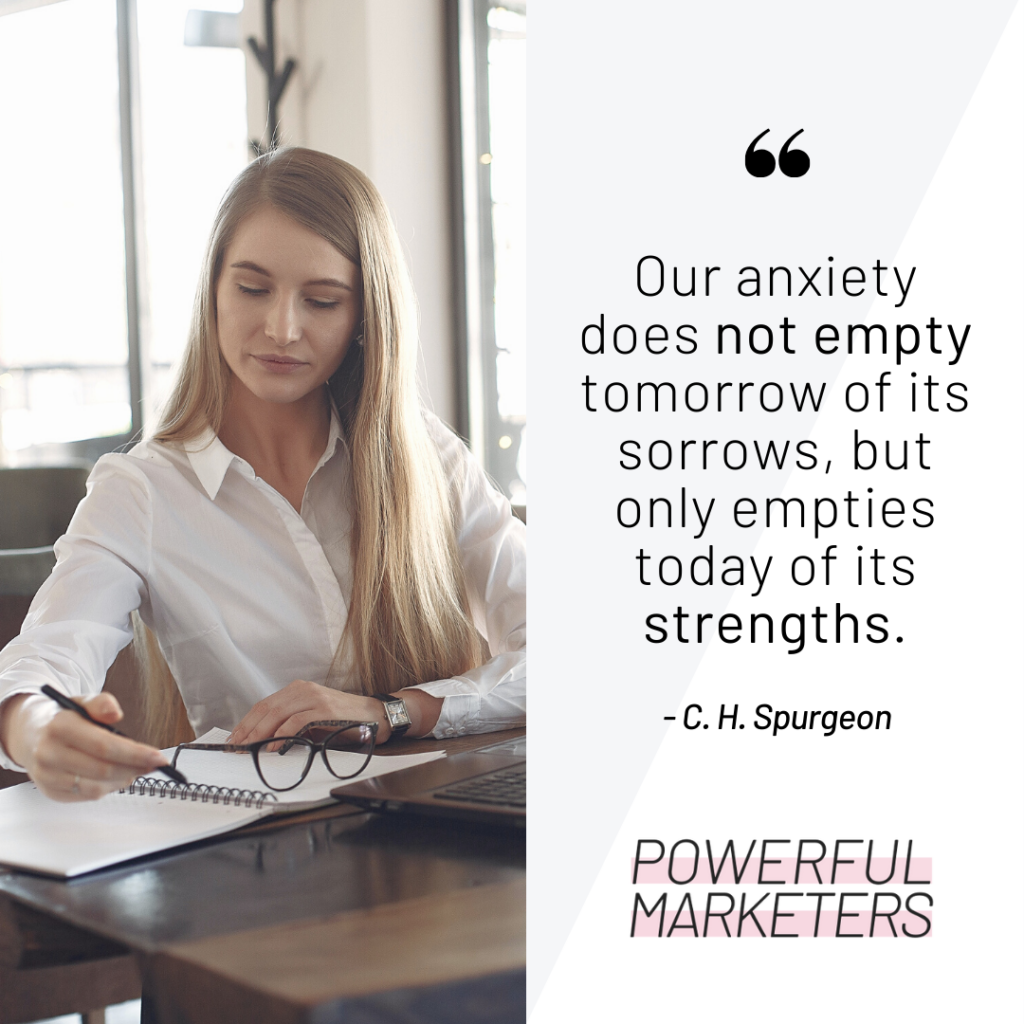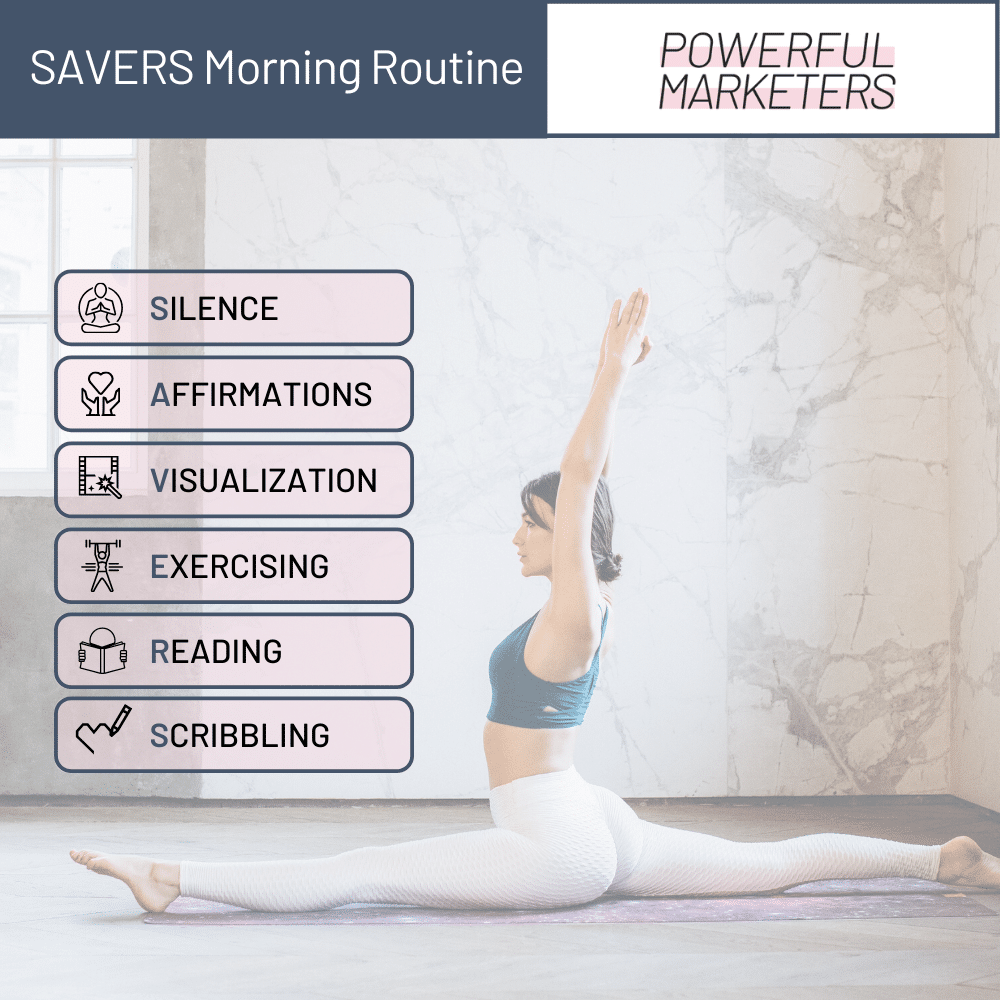Uncertain times are always the basis for stress and anxiety. And the current pandemic combined with the uncertain economic climate forms the perfect blend for chaos. If you are not mindful about the things that you are experiencing, they can easily become overwhelming.
Anxiety is something that all of us experience at one point or another, but the important thing is to know how to manage it so that it does not grow to be bigger than life. On one of the Powerful Marketer Talks webinars, we discussed how to notice the signs of anxiety, what are the biggest causes for marketer’s anxiety, and how to manage anxiety effectively. Watch the full recording of the webinar at the end of the post!

Marketer’s anxiety is typically caused by:
- Unbalanced lifestyle: working too much, spending too little time with family and friends, not getting enough rest.
- Information overload: being influenced by the never-ending incoming flow of information, and not being able to differentiate the important pieces of information from the noise.
- Distractions: being constantly interrupted by other people, by technology and things happening around you.
- An addictive disorder: being addicted to a substance or a negative habit or even a person.
Raise your awareness to notice the things, situations or people in your life that may amplify your anxiety. The first step to change is always self-awareness!
8 ways to manage your anxiety
1. Accept & acknowledge your anxiety
We all feel anxious sometimes and we just need to acknowledge it in order to deal with it effectively. A good way of learning to accept your anxiety is by reminding yourself that your anxiety is simply a temporary emotional reaction. Acceptance is critical, because trying to struggle against anxiety often makes things worse. So, once you acknowledge it, and give it the space and time that it needs, you are better prepared to deal with it.
2. Breathing and EFT techniques
Deep breathing is a powerful anxiety-reducing technique because it activates the body’s relaxation response. To do this, simply inhale slowly to a count of 4, filling your belly first and then your chest, gently hold your breath to a count of 4, exhale slowly to a count of 4, and repeat the process several times.
Another way is to use the Emotional Freedom Technique or EFT, best known through the works of Christine Disant and also Gary Craig. EFT is just a set of techniques that utilize the body’s energy meridian points. You can stimulate these meridian points by tapping on them with your fingertips – so, it’s literally tapping into your body’s own energy and healing power. We recommend downloading the free PDF from the homepage of Christine Disant for further instructions.
3. Deconstructing brain tricks and asking yourself questions
When we feel anxious, our brains tend to spiral and come up with all sorts of outlandish and rather extreme ideas, like “I will be fired because I forgot to do this one thing” or “Everybody will laugh at my presentation” or “It’s pointless, the product will fail anyway. Who am I to innovate?”. In these situations, how you can help yourself to start thinking rationally again is to ask yourself the following questions:
- Is this worry realistic?
- Is it likely to happen?
- What are the odds of it happening?
- Could I handle that consequence?
- What might I do if it actually happened?
- If something bad happens, what might that mean for me?
- Is this fear likely to become true or does it just seem that way?
- What are the other possibilities that might occur?
If you take the time to think these questions through, you are likely to discover that those worst case scenarios simply aren’t realistic.
4. SAVERS morning ritual
Hal Elrod, an American author, keynote speaker and success coach, shared in his book “The Miracle Morning” how anybody can empower their life by following a certain ritual every morning. SAVERS is actually an abbreviation, in which each letter signifies an activity that can truly improve your life:
- S for silence: meditation, prayer, reflection, deep breathing, and gratitude
- A for affirmations, positive self-talk and encouraging words
- V for visualization of the future: who and what you want to become
- E for exercising to boost your energy and improve your well-being
- R for reading inspiring books and articles
- S for scribbling down your ideas, learnings, and other thoughts in your journal

Of course, not all of these may be ideal for you, and you shouldn’t try to implement all of them at once, as it is likely to overwhelm you. But start with one or two or three, and be consistent. Soon you’ll start to see a change in your life!
5. Emotions journal
Observe your emotions and keep a journal about them for 14 consecutive days. Simply notice and write down when you have a certain negative feeling, where were you as you felt it and if you were alone or with somebody. If you do this kind of observation for at least 14 days you will start identifying patterns in your life. And this information is a good mirroring technique for yourself, because it helps you to consider many things about yourself and pinpoint exactly when and where you experience anxious feelings. As soon as you have a clear understanding of that, you have a much stronger basis for making improvements.
6. Focusing on the now
It is easy to get carried away by a steadily growing pile of unexpected tasks. Eventually, what you might find is that instead of actually doing the work, you are stressing about the work that needs to be done. Or, that when you are at work, you are stressing about the things that need to be done at home, and vice versa. We tend to be so preoccupied with “what’s next” that we forget to experience the present — right now. Anxiety feeds upon your stress. So be mindful about focusing on one important thing at a time. And remember the words of Emily Dickinson: “Forever is composed of nows.”
7. Doing fun & physical activities
Remember to move your body and to have fun on a daily basis! Being in physical action pushes you to move forward, literally and also mentally. You can exercise at home, at the gym or outside in the open air. There are plenty of opportunities! And by having fun, feeling active and energetic you rejuvenate yourself!
8. Discipline & routine
In order to get your life in balance you need some discipline and routine. And while discipline and routine can have negative associations, they can actually also help you to maintain a positive and a healthy lifestyle. Because unfortunately, our monkey mind doesn’t always want to do what’s GOOD for us but would rather do what’s EASY for us. But if you work on your routines, your routines will work FOR YOU! In other words, if you keep your little important daily routines, then it’s easier to get back on track and build new disciplines for yourself and for your job. Discipline gets us going towards a desired outcome or a lifestyle, and routine is what keeps us going even if some variables change.

You have one life and you need to make the most of it. That also means your willingness to put in the work and “pay” the price for your own success – by doing things you don’t like or things that are not easy. But only by committing to something and acting towards it, you can really achieve something.
And commitment means you will do things even if you don’t feel like doing them, or if you don’t have ‘time’ to do them. So, don’t break promises to yourself. Commit to your long-lasting happiness and you will see great results: your anxiety level will go down, you’ll grow your confidence, you will grow your will and most importantly you will grow your self-esteem as you prove to yourself that you can do it!
#anxiety #balance #routine #discipline #mentalhealth #wellbeing #happiness #personaldevelopment #selfimprovement #growth #psychology #confidence #marketers #marketing